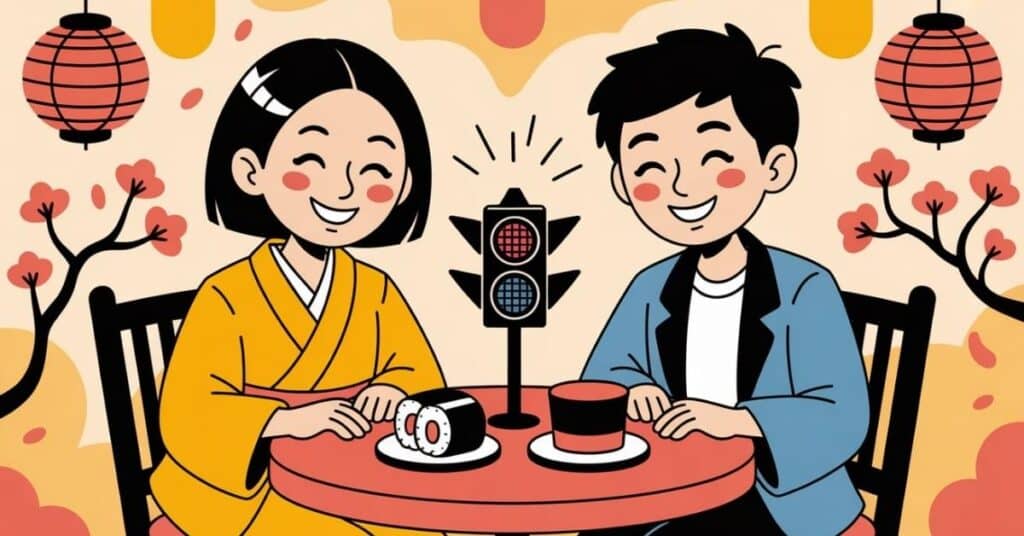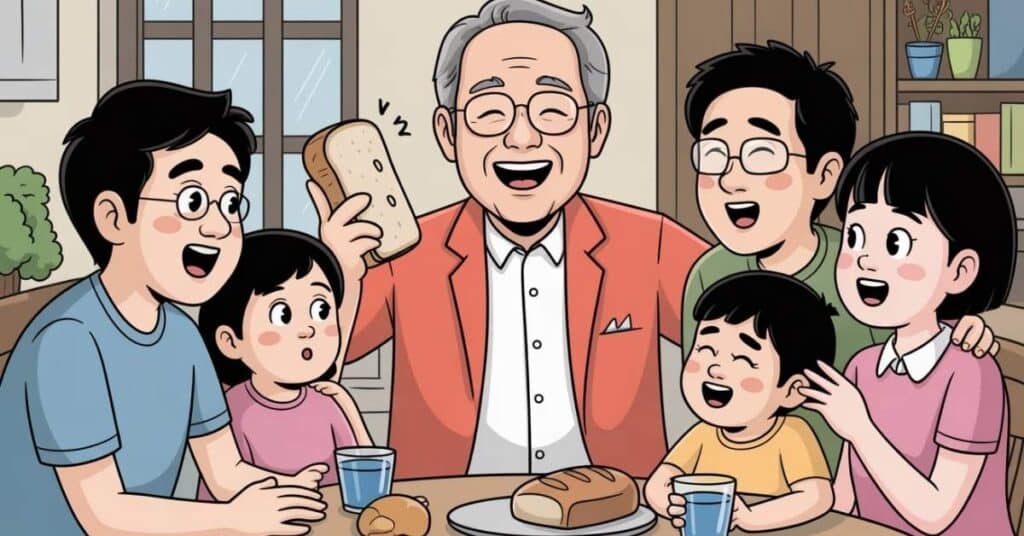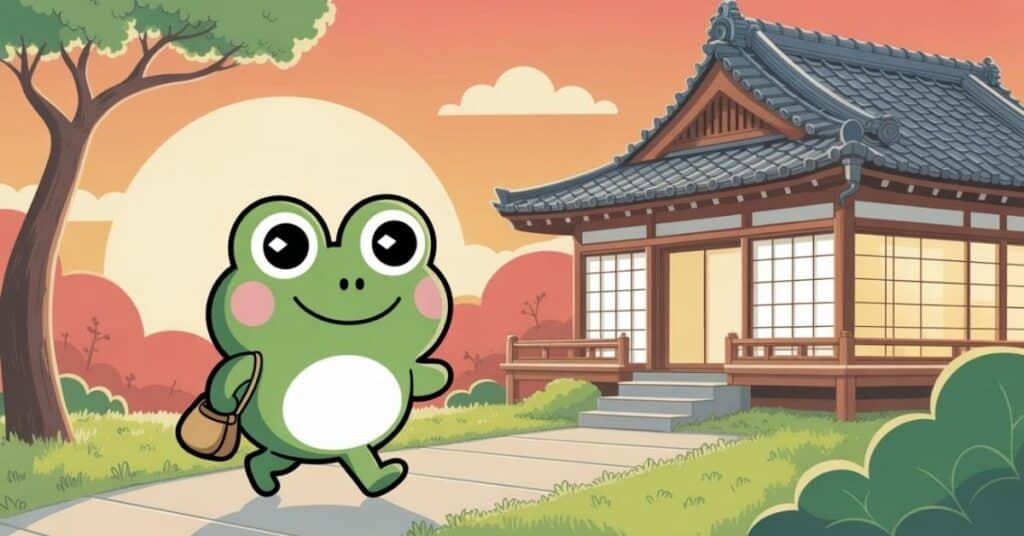Japanese jokes are loved because they are simple and clever. Many Japanese jokes use puns, silly phrases, and wordplay that make people laugh. When you read Japanese jokes, you can enjoy humor while also learning about culture. These Japanese jokes are easy to remember and fun to share with friends. They must show how laughter can cross borders.
In this collection, you will find 200 Japanese jokes written in clear English. These Japanese jokes include funny puns, dad jokes, and popular jokes that everyone enjoys. Reading Japanese jokes must make you laugh and learn at the same time. Japanese jokes bring humor that feels both unique and universal.
Common Japanese Jokes

Japanese people love simple word jokes that anyone can enjoy. These common japanese jokes use homophones, short phrases, and easy puns.
- What do you call a hat that tells jokes? Boushi (hat) becomes bo-shi, sounding like “funny boy.”
- Pan tsukutta → Sounds like “I made bread” but also “I cut pantsu (underwear).”
- Why can’t you find cheap salmon? Because Ikura wa ikura? means “How much is salmon roe?”
- What happens when you repeat Shouga nai (can’t be helped)? You get a silly loop: “Shouga nai, shouganai!”
- Pantsu kutta → Can mean “cut pants” or “ate bread.”
- Why did the loanword Boushi get nervous? Because it was “borrowed” from English.
- When someone says “izu,” it sounds like “Is it?” in English, but also a Japanese place.
- A Japanese man walks into a bar and orders “light”—the bartender hands him a traffic light.
- Why did the stranger sigh in the cafe? He remembered the joke process but forgot the punchline.
- How much is ikura? Always too much.
- Why was the oyaji gag so cringe? Because repetition killed the humor.
- Why did the flustered man sit at the bar? He forgot if it was a hat joke or a pants joke.
- Why is English hard in Japan? Too many homophones competing with dajare.
- “Shouganai” becomes “show guy night” in Engrish pun form.
- At social gatherings, why do people laugh? Not at the joke, but at the dad telling it.
- Ikura joke = universal. The more you ask, the more you pay.
- Pun type: boundary jokes cross from cheesy to brilliant instantly.
- Why was the phrase pattern confusing? Because the pun depended on kanji readings.
- Humorous cringe moment: oyaji gyagu in front of strangers.
- A man walking with eyes closed—his punchline was missing.
Japanese dad jokes

In Japan, dad jokes (oyaji gyagu) are legendary. They’re simple, repetitive, and often cause groans instead of laughs—just like in the USA.
- Oyaji: “Ikura wa ikura?” Child: “Dad, not again!”
- Oyaji: “Shouga nai!” Family: “Please stop repeating it.”
- Oyaji: “Pantsu kutta!” Everyone groans.
- Oyaji loves to say “Pan tsukutta” at every dinner.
- Old man gag: Boushi the hat “bows” when you wear it.
- Oyaji jokes are cheesy, but that’s why they stick.
- Dad in Japan says “Oyaji gyagu” proudly, even when no one laughs.
- Why do oyaji jokes sound like English loanwords? Because oyajis love mixing them.
- Oyaji gag boundary: one more and you’re grounded.
- Why do oyaji gags sound complex? Because they’re actually very simple.
- Oyaji repeats “shouganai” until it means nothing.
- Dad loves to say “Ikura wa ikura?” at sushi restaurants.
- Oyaji says “Izu is it?” to sound bilingual.
- Oyaji adds “nai” to everything—instant joke formula.
- Cheesy oyaji humor = free family embarrassment.
- Oyaji jokes sound funnier at izakaya after drinks.
- Oyaji laughs hardest at his own gag.
- Oyaji tells “Boushi pun” to strangers at bar.
- Oyaji says “context doesn’t matter, pun does.”
- Oyaji gag survival rule: smile politely.
Favourite Japanese Jokes
These are the jokes people often remember most. They may be terrible or brilliant, but they become favourites because of how often they’re told.
- Interviewer: “What’s Michael Jackson’s favorite color?” Answer: Ao (blue).
- Nagoya cafe joke: stranger sits, sighs, and says “punchline missing.”
- Frog dies, traffic light laughs.
- Panda joke: “What’s a panda’s favorite food?” Answer: Pan da (bread).
- Hawaiian dentist joke always makes foreigners giggle.
- Interviewer flustered—forgot joke structure.
- Man walking, memory failing—tells half the joke.
- “マイケルジャクソンの好きな色は何ですか” always gets a confused look.
- Kendal’s friend from Nagoya told this at bar.
- Favourite terrible pun = favourite memory.
- Panda no sukina esa wa? Pan da!
- Why did the interviewee sigh? He thought he failed.
- Frog colour joke ends with “blue.”
- Beginner Japanese learners love the Michael Jackson pun.
- Interview question turns into dad joke.
- Terrible but brilliant: “Ha wa ii kara!”
- Frog joke dissected too many times.
- Panda joke simple, but always funny.
- Favourite Japanese joke = job interview saver.
- Stranger comments, everyone laughs.
The Hawaiian Dentist Joke
This one-liner has become a classic. It’s short, silly, and easy to share in both Japanese and English.
- Q: Why don’t Hawaiians go to the dentist? A: Ha wa ii kara! (Because their teeth are good.)
- Oyaji tells it every holiday.
- Pun works because “Hawaii” and “ha wa ii” sound alike.
- Dentist sighs; oyaji laughs.
- Hawaiian tourist confused at bar.
- Japanese learner explains the pun to American friend.
- Dentist jokes = universal humor.
- Hawaiian joke ranks top in dajare list.
- Punchline simple, cultural twist big.
- Oyaji repeats, family groans.
- USA audience loves the wordplay.
- Beginner-Japanese learners love to retell.
- “Ha” means tooth, “ii” means good—double pun.
- Dentist wordplay crosses language boundaries.
- Hawaii joke easy to memorize.
- Punchline always gets a smile.
- Interviewer told it as icebreaker.
- Hawaii joke vs. American knock-knock joke.
- Hawaiian dentist pun: funny, simple, unforgettable.
- Ha wa ii kara—forever favourite.
What is Dajare?
Dajare are Japanese puns. They can be witty or painfully bad, but they are central to Japanese humor.
- Dajare = Japanese wordplay pun.
- Dajare structure depends on homophones.
- Types: sound substitution, kanji trick, pronunciation joke.
- Advertising often uses dajare for slogans.
- Oyaji gyagu are a type of dajare.
- Dajare meaning: “cheesy pun.”
- Dajare appear in daily conversation.
- Pop culture uses dajare heavily.
- Japanese language allows endless dajare.
- Dajare twist depends on tone.
- Rakugo includes dajare in storytelling.
- Dajare sometimes used to teach kanji.
- Straight face delivery makes it funnier.
- Japanese kids learn dajare early.
- Foreigners practice dajare to learn language.
- Oyaji proud to be dajare master.
- Dajare list = endless humor.
- Japanese gather to tell dajare at izakaya.
- Dajare pattern easy to create, hard to stop.
- Everyone has a favourite dajare.
Funny Japanese Puns to Know
These puns are popular because they’re short and fun. Many are based on simple sounds or everyday words.
- Kami (god, paper, hair) triple pun.
- Skiing joke: Sukii wa suki.
- Frog pun: Kaeru ga kaeru.
- Ikura wa ikura? Sushi pun.
- Neko wa nekoronda (cat lies down).
- Hae ga haee (flies fly fast).
- Toire pun in Kansai dialect.
- Sanda → Santa joke pun.
- Kami ga → Kani ga kansha pun.
- Oyaji says “Tousan shita” (went bankrupt/dad did).
- Katsura wig pun = oyaji favourite.
- Ana o hooru (dig a hole).
- Okashi pun = sweets/joke.
- Me ga ne (glasses / eyes aren’t).
- Ii kanji pun = good feeling/kanji.
- Daily advertising pun list includes sushi jokes.
- Pop culture dajare appears in anime.
- Japanese onomatopoeia used in puns.
- Pun pronunciation twist = laughter.
- Oyaji collects pun examples.
Types of Japanese Puns
Now let’s explore the categories that make Japanese wordplay rich.
- Homophones create simple jokes.
- Sound substitution adds variety.
- Kanji pun adds extra depth.
- Loanword pun = cross-cultural humor.
- Onomatopoeia pun adds sound effect.
- Regional dialect pun adds flavor.
- Food pun always popular.
- Animal pun = cute and funny.
- Job pun = oyaji favourite.
- Color pun = clever and easy.
- Interview pun = situational humor.
- Frog pun = timeless.
- Panda pun = global.
- Hat pun = visual.
- Skiing pun = sporty.
- Toilet pun = cheeky.
- Cat pun = always lands.
- Glasses pun = nerdy.
- Kanji pun = cultural treasure.
- Oyaji pun = king of them all.
Ika ga ii ka? (イカがいいか?)
This pun works on food and question sounds.
- Ika (squid) and ii ka (is it good?) blend together.
- Oyaji orders squid and asks ii ka?
- Sushi chef laughs politely.
- American friend confused.
- Japanese learner explains pun.
- Seafood pun = restaurant classic.
- “Ika” becomes English “I care” pun.
- Oyaji repeats ika joke endlessly.
- Pun structure simple but effective.
- Squid pun = seafood humor.
- USA sushi fans retell ika joke.
- Japanese bar pun uses ika.
- Oyaji makes ika face while saying it.
- Kids love ika jokes.
- Dajare pattern clear in ika joke.
- Squid pun appears in anime gag.
- Ika pun + drink order = oyaji combo.
- Japanese learners test ika joke first.
- Sushi menu pun with ika highlighted.
- Squid joke: fresh, tasty, funny.
Sukii wa suki (スキーは好き)
This pun is about sound similarity.
- Sukii = skiing, suki = like.
- “I like skiing” → pun form.
- Oyaji says it every winter.
- Ski resort signs use pun.
- Japanese learners smile at simple pun.
- American tourists laugh at translation.
- Skiing joke easy to remember.
- Pun pronunciation clear.
- Winter advertising slogan uses it.
- Oyaji repeats it on ski lift.
- Ski kids groan at oyaji.
- Ski shop uses pun for campaign.
- Sukii pun appears in comedy shows.
- Pun teaches pronunciation.
- Japanese wordplay lesson includes it.
- Ski culture embraces pun.
- USA ski fans find it charming.
- Ski school teacher explains pun.
- Pun works in both casual and formal chat.
- Sukii wa suki = timeless winter pun.
Kaeru ga kaeru (カエルが帰る)

This pun combines “frog” and “return.” Context makes it funny.
- Frog goes home = kaeru ga kaeru.
- Oyaji says it every spring.
- Frog pun works because of homonym.
- Kids love frog puns.
- Frog joke used in Edo rakugo.
- Frog pun appears in anime too.
- American learners love frog story.
- Kaeru pun = classic dajare.
- Frog joke easy to teach.
- Oyaji repeats at family dinner.
- Frog joke becomes bedtime pun.
- Frog pun structure teaches context.
- Frog dies, everyone still laughs.
- Frog pun symbolic in Japanese culture.
- Frog = luck symbol, pun = fun.
- Kaeru pun found in textbooks.
- Frog pun appears on T-shirts.
- Oyaji says it at bar.
- Frog pun with traffic light variation.
- Kaeru ga kaeru = forever pun.
Conclusion
In the end, Japanese jokes are fun and full of clever wordplay. Many people love these jokes because they are short and simple. The focus keyword Japanese jokes shows how humor can cross cultures. Japanese jokes often use puns, silly twists, and smart plays on words. These Japanese jokes must bring a smile even when they sound cheesy.
When we read Japanese jokes, we learn both language and culture. These Japanese jokes must make learning easy and fun. The focus keyword Japanese jokes also shows how laughter can connect people. These Japanese jokes must stay in your memory because they are simple and funny. In life, Japanese jokes remind us that humor has no borders.

Jax Jokely is a seasoned humorist with over a decade of experience crafting sharp, laugh-out-loud content. Known for his clever wit and playful tone, he’s penned countless jokes and punchlines that have lit up columns, comedy sites, and social feeds alike. Whether it’s quick one-liners or clever observations, Jax brings the kind of humor that sticks—and speaks.

